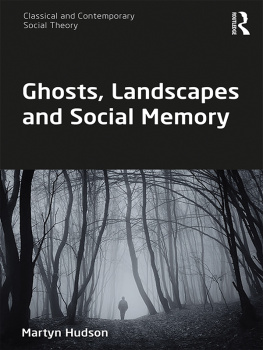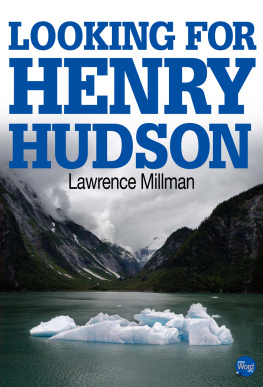First published 2007 by Ashgate Publishing
Published 2016 by Routledge
2 Park Square, Milton Park, Abingdon, Oxon OX14 4RN
711 Third Avenue, New York, NY 10017, USA
Routledge is an imprint of the Taylor & Francis Group, an informa business
Copyright Martyn Hudson 2016
Martyn Hudson has asserted his moral right under the Copyright, Designs and Patents Act, 1988, to be identified as the author of this work.
All rights reserved. No part of this book may be reprinted or reproduced or utilised in any form or by any electronic, mechanical, or other means, now known or hereafter invented, including photocopying and recording, or in any information storage or retrieval system, without permission in writing from the publishers.
Notice:
Product or corporate names may be trademarks or registered trademarks, and are used only for identification and explanation without intent to infringe.
British Library Cataloguing in Publication Data
A catalogue record for this book is available from the British Library.
The Library of Congress has cataloged the printed edition as follows:
Hudson, Martyn, author.
The slave ship, memory and the origin of modernity / by Martyn Hudson.
pages cm. -- (Memory studies: global constellations)
Includes bibliographical references and index.
ISBN 978-1-4724-5343-3 (hardback)
1. Slave ships. 2. Slavery. 3. Collective memory. 4. Civilization, Modern.
Title.
HT871.H83 2016
306.3'62--dc23
2015028323
ISBN: 9781472453433 (hbk)
ISBN: 9781315552866 (ebk)
Introduction The Slave Ship, Memory and the Origin of Modernity
The starting-point of critical elaboration is the consciousness of what one really is, and is knowing thyself as a product of the historical process to date which has deposited in you an infinity of traces, without leaving an inventory -Antonio Gramsci (1971:324).
This book aims to describe the relationship between the slave ship and modernity from the sixteenth century onwards through an examination of its materiality and memory. In recent years accounts of the experience of the middle passage by Marcus Rediker, Emma Christopher and Stephanie Smallwood have attempted to elaborate upon the cultural significance of what Paul Gilroy calls the Black Atlantic. That experience would come to define not just African-American identity but the cultures of a global humanity. The very experience of the passage would be a defining moment in the development of the Atlantic and then the world-system of accumulation. It was, if not the mother of modernity, certainly its midwife extending the enclaves of primitive capital accumulation across the seas using the machine of the ship. The ship itself was entwined with the accumulative and productive regimes of the factory and the plantation but it was also a manufactory of memory, a device for the fabrication of the hybrid, creole cultures of the new world and the Atlantic littoral.
Our attempt at understanding the centrality of the middle passage and its relationship to memory studies is immediately confronted by three fundamental problems; the almost entire extinction of the materiality of the slave ship, the relatively few memory accounts of the passage, and the role of the passage as a mediating experience between Africa and the Americas.
The extinction of the materiality of the ship is to some extent mitigated by recent discoveries in maritime archaeology and the development of the new archaeologies of the plantation but it is apparent that perhaps our clearest and most forceful understanding of the ships lies in a single document the illustration of the slave ship Brookes. Unable to go back and ethnographically describe the social relations of the ships, to re-experience the storms and the patterns of weather, or to delineate the horrors of the ships dark hold it has often fallen to the aesthetic realm to describe that wooden world as in Turners painting of the Zong massacre.
There are few accounts of the passage from the perspective of the slave. Understandably there were few written documents testifying to that experience. There are official accounts, often in the form of inventories and catalogues, and there are accounts of sailors some of whom converted to the cause of abolition. Significantly, there are remnants of memory of the passage but they lie in material and cultural artefacts that are not directly accounts from memory but are refractions of that experience often creolised or mystified in song and folktale. Or African memory structures that were transferred in the bodies of the slaves through the mediation of the passage; in language, in the physical manifestation of military techniques, in plantation architecture, ritual, and culinary practices.
The question of African inheritance and its effects upon the new African-American cultures of the new world is itself a source of contention amongst both scholars and activists. Ideas of African retention are often used to argue that the cultures of slaves in the Americas were African cultures sharing the same cultural spaces, even if dislocated and in exile, with other cultures. Alternatively there are arguments that the black cultures of the new world were a product of the plantation experience and were entirely new. Neither is the case. Captivity, the passage, and the plantation experience, created a multiplicity of new hybrid cultures, constantly recombined and reworked retaining aspects of their African origins but recomposed with other identities and traditions. In fact, having emerged from multiple African origins the very notion of Africanness as a unifying identity was forged upon the ships themselves as new solidarities of shipmates emerged which would be sustained into the plantations. Further, it is that moment of passage rather than African retention or new world genesis that is the defining creation myth of African-America. It is on the ship itself that the ethnogenesis of African-America is forged. Forged, we might add, not out of submission but out of the resilience and resistance of memory against dispossession and servitude.
Examining the slave ships role in the Black Atlantic and in the cultural production of modernity means an examination of gaps, losses, and dislocations. Attempts to understand the social relations of the ships are confounded by the problems of historical ethnography and by the ethics of describing irrecoverable experiences. The multiple proliferations of visual representations and even of replicas of the ships raise significant questions about the ownership of stories, authorial voices and the role of memory-institutions like museums and galleries in displaying slavery and genocide as lessons or even entertainment. The global extension of the Brookes illustration was part of abolitionist discourse and subsequently decisive for its role in ending the trade, but its depictions of the slave cargo are another repetition of cataloguing and display. Once again we see the subjection of human beings to a numbered mass of objects.
This is neither a history of, nor a full anthropological account of, the slave ship. In any attempt to locate the significance of the passage experience for modernity it is imperative that we address the question of individual and collective memory and the phenomenology of that passage to African-American experience. Further, understanding the role of memory in history and the modes of resistance and solidarity that were entwined with subjection and captivity, we also provide tools and resources for understanding contemporary communities in motion across the sea, sometimes trafficked, sometimes enslaved. The






